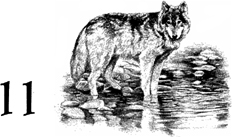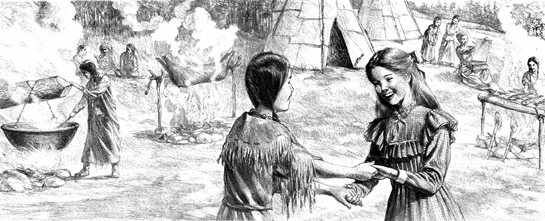

Spring arrived with the shrieks of returning seagulls. The hawks came back and then an eagle. One misty day there was a yellow rush of little warblers. I began to feel sorry for Icarus. He was shut up in the house away from all the other animals. For several days I put off what I had to do. Finally I took Icarus outside, kissed him, and let him go. He leaped up onto a nearby oak tree and clung to the trunk, looking down at me. I held my breath. Soon he was gliding from tree to tree. And then he was gone. I waited a long while, but he did not come back. I knew that I had been right to let him go, but that didn’t make it any easier.
Early in May Ke che gaw baw returned from the north. He had come to find a bride. Fawn said he was full of stories of the country around Kitchi-Gami. “He talks of the many animals in the woods where they live. He says they can walk for two days on land that no one owns.”
The Indians of La Croix were busy cultivating the land they had bought. “They would rather be hunting in the woods like Ke che gaw baw than doing women’s work in the field,” Fawn told me.
“But they won’t follow the others north, will they?” I asked. I was afraid that Fawn and her family would go away again.
“No. They would not leave their sacred burial ground. Besides, our chief says the white man follows the Indian like his shadow. Soon he will claim the land where Ke che gaw baw has made his new home.”
One afternoon when I visited the camp with Papa, I saw Ke che gaw baw. He was dragging a deer toward one of the wigwams. Papa said, “He is showing the family of the girl he courts that he is a good hunter and can provide for a wife.”
All afternoon Fawn and I helped the women spread the nets for fishing. As we returned to the village, I heard what sounded like the sweetest of bird calls. It was unlike any birdsong I had heard before.
Fawn smiled. “It is Ke che gaw baw playing his courting flute. He has stood outside of White Deer’s wigwam with his flute for many days.”
“Doesn’t White Deer’s family want her to marry Ke che gaw baw?” I asked.
“Oh, yes, but it would not be proper for them to agree quickly.”
Fawn took me along with her to gather mushrooms. The leaves on the trees were no larger than the ears of a mouse. The sun poured down onto a carpet of wildflowers. They were pushing up through drifts of last year’s leaves. “We must look for mushrooms,” Fawn said, “like this one and this.” Fawn snatched at two mushrooms poking up from the ground. They were the exact color of the brown leaves.
I reached for some bright orange mushrooms, but Fawn stopped me. “You must be careful,” she warned. “Those mushrooms will cause death.” After a little while I became better at finding the good mushrooms. But I decided to leave the gathering to Fawn.
Tired from our searching, we sat down to rest in a patch of flattened grass. My friendship with Fawn was often a silent one. Fawn waits a long time between words. Only the songs of the returning birds made the woods noisy. Suddenly we saw a movement in the tall grass. We held our breaths, waiting to see what was hidden there.
What we saw were three puppies. Except for a patch of gray on their heads, the pups were all black. As we watched, they tussled with one another, touching noses, nipping at one another’s ears, and tumbling over one another. A gray shadow moved through the grass. The shadow limped. It was our wolf! I jumped up and ran toward the pups, anxious to hold them. I was sure the wolf would welcome us. But as I came closer, its hackles stiffened. I heard a low, threatening growl and then the wolf lunged at me. It would surely have snapped its jaws around my wrist if Fawn had not pulled me away. We ran toward the Indian village as fast as we could, never looking behind us.
On the ride back home with Papa I told him what had happened. He gave me a stern look. “You must never get near wild animals, Libby, especially when they have young ones.”
“But the wolf must have known us. She was our wolf.”
“The wolf was doing just what animals are supposed to do,” Papa said. “She was protecting her young.” I thought of the picture in the Bible of the Garden of Eden. In the picture the wild animals all have smiles on their faces and follow Adam and Eve around like puppies. Now I understood that our woods was no Garden of Eden.
We did not see the wolf or her pups again. I thought of them often that summer. The pups would be learning to hunt. Little by little, their land would be taken from them. One day like Ke che gaw baw, the wolves would seek wilder land and disappear from here forever.
Ke che gaw baw and White Deer were to be married. The tribe invited us to come to the marriage ceremony.
On the day of the wedding we traveled through sunlight. The small pale green leaves, budding on the trees, hardly made any shade at all. “Happy is the bride the sun shines on,” said Mama. She had brought her paints. Our wedding gift to White Deer and Ke che gaw baw would be their portraits.
We arrived to find the whole village astir. Earlier that morning White Deer and Ke che gaw baw had gone to the church in La Croix to be married. Now it was time for a large feast.
Papa talked with the chief and Sanatua while Mama got out her paints. Many of the Indians gathered around her to watch. I went to find Fawn. She was with the women who were preparing the feast. Sticks had been split at the top and fish tucked into the slots.

The sticks were stuck into the ground next to the fire to cook. Grouse and ducks also roasted on sticks. They gave off a funny smell, for they were cooked with their feathers on. Haunches of deer were roasting. Corn and squash were cooking in maple syrup. There was so much food that I did not see how even the whole village could eat it all. But they did and I helped.
Because everyone was so full, the dancing began slowly. But soon the drums beat faster. There was much good-natured teasing of White Deer and Ke che gaw baw. Only White Deer’s mother and father were quiet. They knew that in another day their daughter would leave the village to go to Ke che gaw baw’s home. Most likely they would not see her again.
The chief raised his hands for silence. He looked like a king with his long silver earrings and beaded headdress. He spoke in the Ottawa language, so I could not understand him. Fawn said that he was giving a blessing to White Deer and Ke che gaw baw. “He is saying we have much to celebrate this year, for the tribe now owns the land we need.” Fawn smiled at me. “He thanks your father.”
After the talk there was more dancing, but Mama said it was time to take William home. I was sorry to leave and did not think it fair that I had to go just because William was sleepy. On the way back the moon lit the trail for us. We could hear an owl hooting.